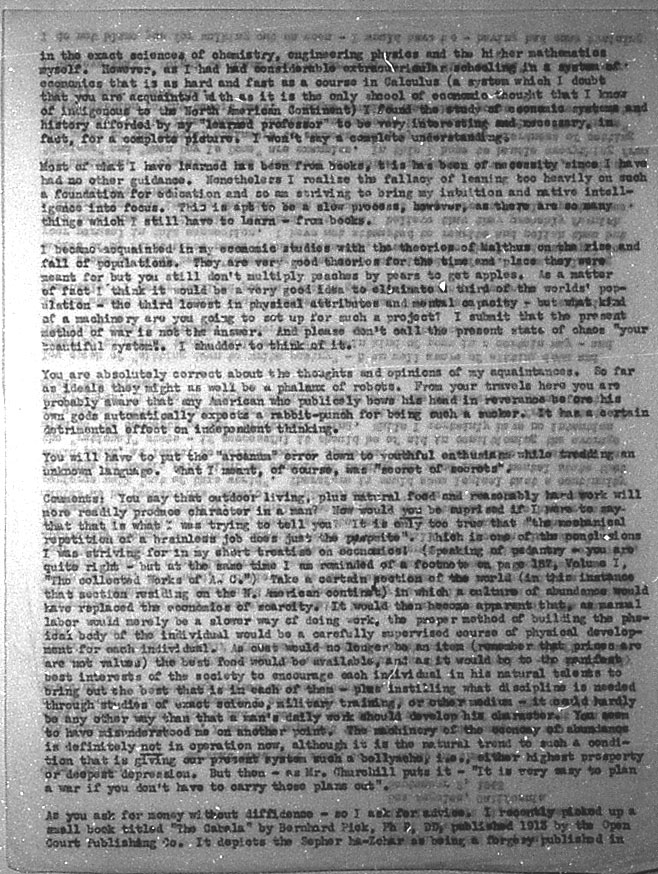1803rd Ord MM co. (Avn)
68th Service Group
APO 182, Unit #1 % Postmaster
Los Angeles, California
September 2, 1943
Care Frater:
Do what thou wilt shall be the whole of the Law.
Old business first: No, I was not surprised that Claire was the only one who came out with a clean slate. But I had to be sure and the quickest way of finding out was to ask someone on whose judgment I could rely. What is all this about “The question of Paternity”? I certainly raised no such question.
I really must apologize for going “on and on” about the Claire question — I distinctly remember thinking to myself “This may bore him to death but I might as well finish now that I have started.
You wanted to know what DeCasseres and Smith had to do with the Question? The answer is: nothing. I introduced their poems merely as an illustration of some thoughts I had in mind, as I said, I believe. At the present time I am interested in a project of using words in a poetic form to lead the mind “around the bend”. Explanation — your “involuted curve”. Some surrealists, if I interpret what I think I see correctly, apparently attempt to show us visually what we might call the “fourth dimension”. The music of Sibileus, for one, would seem to lead the mind “up and over the edge”. Or some of that of Debussy. To follow the thoughts of a student of the higher mathematics as he peruses his “powers” and dimensions by “sines of the times” one might perforce walk “out of this world”. Therefore it would seems logical that a continuity of words in poetic form might be capable of leading the mind into a mental state that would point, at least, to worlds “out of space and time”. This while the mind is in the “rational” state — if successful it should be of aid in conditioning the average mind to the concepts of the “irrational” mind. While I certainly have no intention of copying either DeCasseres or Smith I think that much can be gained from a study of their works. I have no scruples against standing on the shoulders of giants that I might see farther.
You speak of “sitting down to write poetry” — I am well aware of sitting down and swearing to myself that I would write a certain kind of poem in a certain way — and producing exactly nothing. It certainly has to be spontaneous.
At the moment I am reading your “Ascension Day” and “Pentecost” which I am enjoying immensely. I never realized you had such a gargantuan sense of humor.
You spoke of there being “something wrong deep down inside” of me. I am enclosing copies of my first three poems (Wahlpurgisnacht, Dream of the Ghoul, and Entropy) for your perusal in this connection. I have not attempted to rewrite and polish them but have left them as originally finished. As such I believe that they probably furnish a clearer insight into my thinking than any others as they were certainly spontaneous. I had to write them.
New business: “Voyager” is the framework of another project I have in mind, of which “Cyclops” and “When Day Is Done” are examples. In this I hope to handle everything from the sagas of the spatial engineers to sonnets that, but their very weirdness of setting and theme, will be like looking through a microscope into another world. “The Gnome” is my reaction to the desert heat. I might mention those poems that are not dated are all over a year old.
I believe that I forgot to thank you for the copy of “The City of God”. I do so now.
I do not blame you for walking out on econ — I would have to — having had some training in the exact sciences of chemistry, engineering physics and the higher mathematics myself. However, as I had no considerable extracurricular schooling in a system of economics that is as hard and fast as a course in Calculus (a system which I doubt that you are acquainted with as it is the only school of economic thought that I know of indigenous to the North American Continent) I found study of economic systems and history afforded by my “learned professor” to be very interesting and necessary, in fact, for a complete picture. I won’t say a complete understanding.
Much of what I have learned has been from books, this has been necessary since I have had no other guidance. Nonetheless I realize the fallacy of leaning to heavily on such a foundation for education and so am striving to bring my intuition and native intelligence into focus. This is apt to be a slow process, however, as there are so many things which I still have to learn — from books.
I became acquainted in my economic studies with the theories of Malthus on the rise and fall of populations. They are very good theories for the time and place they were meant for but you still don’t multiply peaches by pears to get apples. As a matter of fact, I think it would be a very good idea to eliminate a third of the words’ population — the third lowest in physical attributes and mental capacity — but what kind of a machinery are you going to set up for such a project? I submit that the present method of war is not the Answer. And please don’t call the present state of chaos “your practical system”. I shudder to think of it.
You are absolutely correct about the thoughts and opinions of my acquaintances. So far as ideals they might well be a phalanx of robots. From your travels here you are probably aware that any American who publicly bows his head in reverence before one of his own gods automatically expects a rabbit-punch for being such a sucker. It has a certain detrimental effect on independent thinking.
You will have to put the “Arcanum” error down to youthful enthusiasm while trying an unknown language. What I meant, of course, was “secret of secrets”.
Comments: You say that outdoor living, plus natural food and reasonably hard work will most certainly produce character in a man? Now would you be surprised if I were to say that that is what I was trying to tell you? It is only too true that “the mechanical repetition of a brainless job does just to opposite”. Which is one of the conclusions I was striving for in my short treatise on economics! (Speaking of pedantry — you are quite right — but at the same time I am reminded of a footnote on page 167, Volume I, “The collected Works of A.C.”). Take a certain section of the world (in this instance that section resting on the N. American continent) in which a culture of abundance would have replaced the economics of scarcity. It would then become apparent that, as manual labor would merely be a slower way of doing work, the proper method of building the physical body of the individual would be a carefully supervised course of physical development for each individual. As cost would no longer be an item (remember that prices are not values) the best food would be available, and as it would be to the manifest best interests of the society to encourage each individual in his natural talents to bring out the best that is in each of them — plus instilling what discipline is needed through studies of exact science, military training, or other medium — it could hardly be any other way than that a man’s daily work should develop his character. You seem to have misunderstood on another point. The machinery of the economy of abundance is definitely not in operation now, although it is the natural trend to such a condition that is giving our present system such a bellyache, i.e., either highest prosperity or deepest depression. But then — as Mr. Churchill puts it — “It is very easy to plan a war if you don’t have to carry those plans out”.
As you ask for money without diffidence — so I ask for advice. I recently picked up a small book titled “The Cabala” by Bernard Fick, Ph D, DD, published 1913 by the Open {…} Publishing Co. It depicts the Sepher ha- Zohar as being a forgery published in the 13th Century by a Moses de Leon who falsely attributed it to “the Tanaite rabbi Simon be Jochai”. Its mystic system of numbered letters is compared unfavorably with certain obviously stupid numbers rackets, the book “The Kabbalah Unveiled” by S. L. M. Mathers, London, 1887, is represented as being only a translation of some parts of the Zohar which Knoor von Rosenroth had rendered into Latin. His pillar arrangement of the Tree of Life, or “Decade Sephiroth”, appears very similar to the one that I copied from one of your books. This book certainly appears well documented. Being but a beginner in this work, and therefore uncertain in the face of such apparently well grounded argument, I would appreciate an opinion as to the veracity and trustworthiness of this work.
You say that you have lived in an interesting era and feel sorry for me who live in such a drab world. I see your point. I also see something else. If we are able to apply even our present knowledge correctly after the war — then it will be I who will be sorry that you are not around to enjoy some real living, some real people and some real work and creation. A remark of yours illustrates what I mean. You comment that the arrival of my letter was a “marvel of rapid transit”. To you it may be. To me it is a shame and a disgrace. There is absolutely no reason on earth why that letter shouldn’t have arrived in a matter of hours or minutes instead of days. I have an opinion (not forgetting that I am ever less of a psychologist than an economist) to the effect that no matter how great an intellect may be, it is nevertheless conditioned to life by {…} circumstances and surroundings of the era in which reared and that is therefore “natural” for that person to think in terms of that day and age. To readjust that person to a new set of values is to change the personality of that person. I take it that the original Crowley underwent several such transmutations. I am interested in knowing, if that is so, if he has once again returned to somewhere near that state. I was raised in a world where the telephone and radio were taken as a matter of course, as natural as the flowers in spring tra la. The young man of 80 years from now will certainly have different concepts. How he will think, what “impossible” things he will take for granted, should be interesting. In re that letter again, I was referring to the transmission of the actual material letter, transmission of correspondence by telephone or television would be just as easy.
You say that I show no evidence of original thought — maybe not — but I wouldn’t exactly call half a dozen thoughts expressed in this and other letters as being the result of conventional though processes, either. I wish to express my appreciation for your answering my letters and putting me straight on so many things. The Order, which had become merely something abstract and unreal, a phantom organization with a monstrously bloated creature variously named Crowley, Baphomet, Therion, etc. somewhere in the mists has again become a living entity, something worth knowing and learning about, so it is that once again I am proud to be able to say, and mean,
Love is the Law, Love under Will!
Fraternally, in the Bonds of the Order.
Walpurgisnacht
When Day is Done
Dream of the Ghoul
{crossed out: “Just Call Me”} Urnie
Entropy
The Gnome
Unhallowed Eve
Voyager
Here is a fragment that may give you some idea of what I mean by “around the bend”)
— — As men marooned
On racing meteors have gazed
With fevered eyes — their brains attuned
To Dusky phantoms on the glazed
Backdrop of stars — in dream they see
The sleeting comets crash and burn
And gaunt ribbed worlds flap hopelessly
About a guttered sun — whose urn
Of ashes could spills in the gloom —
These drifting clouds of dust set free
May sail the dead high seas of doom
Forever — yet may never see
Nor spume in breakers on the shore
Of worlds that spin in hyperspace —- —
Beyond the ken of terrene lore
Are planets out of time and place.
Note: Originally published in Thelema Lodge Calendar, May 2001.
Note: Thank you to William Heidrick for making these images available.



